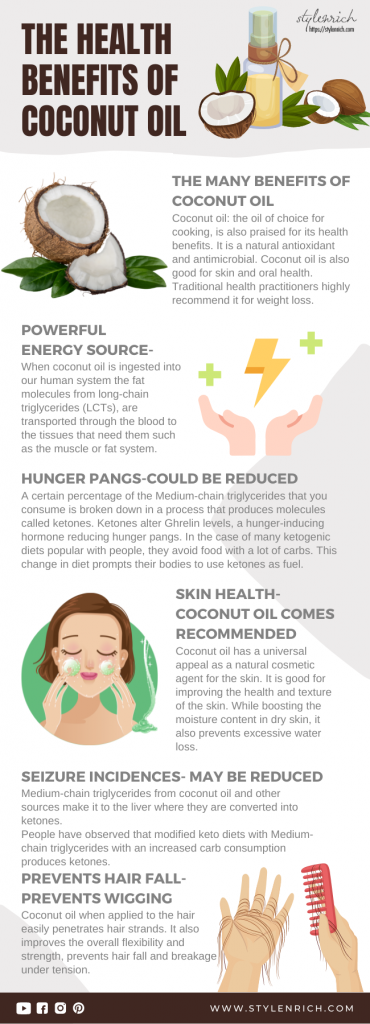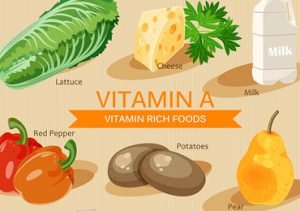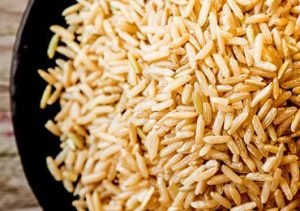Coconut oil: the oil of choice for cooking, is also praised for its health benefits. It is a natural antioxidant and antimicrobial. The health benefits of coconut oil also includes being good for skin and oral health. Traditional health practitioners highly recommend it for weight loss.

Burns fat -supposedly
Medium-chain triglyceride is a type of saturated fat. It is found in rich quantities in coconut oil. Saturated fats are categorized into three subgroups. Each of them has a unique effect on the human body.
– long-chain
– medium-chain
– short-chain
This theory stands ground because the fats in coconut oil are made up of 65% MCT. Hence it may have fat-burning properties. However, there’s no empirical evidence to state that consuming coconut oil by itself will induce calorie burn or burn fat in the human body.
It is highly advisable therefore to exercise caution before eating coconut oil for weight loss as more studies and findings are needed.
Meanwhile, those who vouch for coconut oil should also bear in mind that coconut oil itself is high in calories and so eating it in large quantities could just do the opposite, weight gain.
Powerful energy source
When coconut oil is ingested into our human system the fat molecules from long-chain triglycerides (LCTs), are transported through the blood to the tissues that need them such as the muscle or fat system.
The Medium-chain triglyceride on the other hand head for your liver which gets converted into an instant source of energy.
Anti-microbial effects
Anti-microbial and anti-fungal effects present in coconut oil is due to its MCT content, specifically Lauric acid.
Coconut oil is largely presumed to be effective against disease-causing micro-organisms such as;
– Staphylococcus aureus
– Streptococcus mutans
– Streptococcus pyogenes
– Escherichia coli
– Helicobacter pylori
Research points out that lauric acid may act as a bacteriostatic agent. This agent prevents the replication of the bacteria without killing it. It may also have micro-organism inhibiting properties that are harmful to plants.
Hunger pangs
A certain percentage of the Medium-chain triglycerides that you consume is broken down in a process that produces molecules called ketones. Ketones alter Ghrelin levels, a hunger-inducing hormone reducing hunger pangs. In the case of many ketogenic diets popular with people, they avoid food with a lot of carbs. This change in diet prompts their bodies to use ketones as fuel.
Seizure incidences
Medium-chain triglycerides from coconut oil and other sources make it to the liver where they are converted into ketones.
People have observed that modified keto diets with Medium-chain triglycerides with an increased carb consumption produces ketones. They are effective in reducing seizure incidences.
Ketones can also be effectively used by the brain instead of glucose which gets reduced by cutting down on carbs.
Skin health
Coconut oil has a universal appeal as a natural cosmetic agent for the skin. It is good for improving the health and texture of the skin. While boosting the moisture content in dry skin, it also prevents excessive water loss.
Prevents hair fall
Coconut oil when applied to the hair easily penetrates hair strands. It also improves the overall flexibility and strength, prevents hair fall and breakage under tension.
Oral health
Oil pulling is a process associated with mouthwash. Coconut oil significantly reduces the buildup of harmful bacteria, gum inflammation and cavities. Lauric acid present in coconut oil is a major inhibitor of oral bacteria and dental plaque. However, coconut oil improves oral health is a popular acceptance and not sufficiently validated scientifically.
Alzheimer’s disease may help reduce symptoms
The onset of Alzheimer’s in a person is marked by the hampered ability of the brain to use glucose for energy. Some research findings indicate that ketones can substitute glucose and offset the early onset of this neurodegenerative malady. This is the reason why coconut oil is being extensively researched for treating Alzheimer’s disease.
Rich in antioxidants
Tocopherols, tocotrienols, phytosterols, flavonoids, and polyphenols, are some of the main types of antioxidants present in coconut oil. Rich in antioxidants coconut oil is very good at eradicating free radicals from the human system. Getting rid of free radicals is essential to keep chronic and other degenerative diseases at bay. Additionally, the antioxidants present in coconut oil add up with brain-protective and anti-inflammatory properties.
Conflict perspective of coconut oil
The effects of coconut oil on cholesterol levels in the blood is conflicting according to different scientific studies. One reason could be that the methods employed were different. One study compared coconut oil with saturated fats while the other saw coconut oil being compared with dairy products such as butter. An increase in HDL or good cholesterol reduces the risk of heart disease. At the same time, the American Heart Association holds the view that an increase in HDL need not be directly connected with alleviating the risk of heart disease.
Summary
Scientific studies and their findings notwithstanding coconut oil remains vouched for health. The only lookout here is that moderation is exercised while using coconut oil. For topical applications like skin and hair, a little excess is definitely, ‘fine and shine’.

















